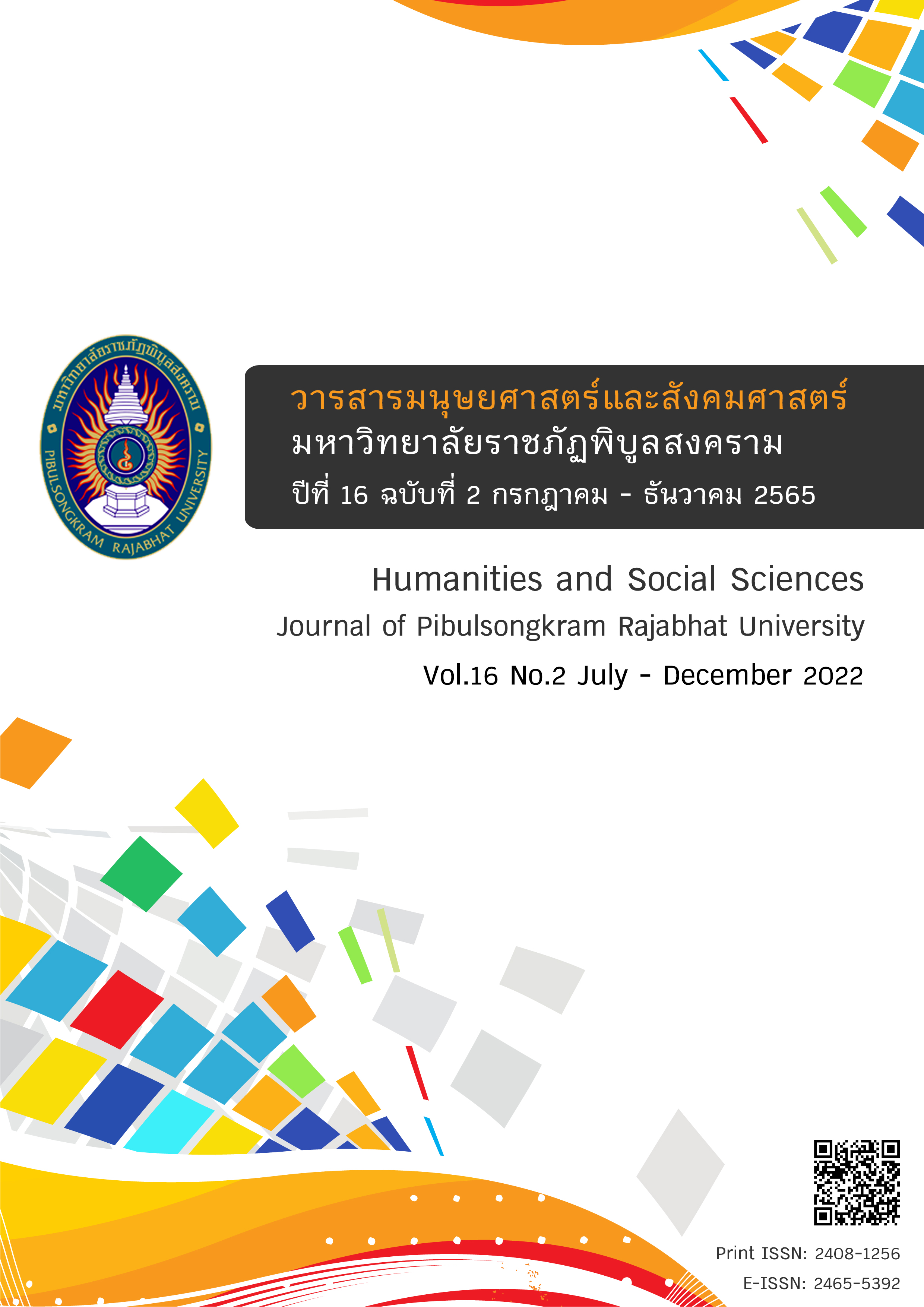การพัฒนารูปแบบการจัดการเรียนรู้ที่เน้นภาระงานผ่านการฝึกพูดอย่างต่อเนื่อง เพื่อส่งเสริมความสามารถในการพูดภาษาอังกฤษและความมั่นใจในการพูดของนักเรียนระดับประถมศึกษา จังหวัดพิษณุโลก
DOI:
https://doi.org/10.14456/psruhss.2022.36คำสำคัญ:
รูปแบบการเรียนการสอน , การเรียนรู้เน้นภาระงาน , การพูดอย่างต่อเนื่อง , ความสามารถในการพูดภาษาอังกฤษ, ความมั่นใจบทคัดย่อ
การวิจัยครั้งนี้มีวัตถุประสงค์เพื่อ (1) สร้างและตรวจสอบคุณภาพของรูปแบบการจัดเรียนเรียนรู้ที่เน้นภาระงานผ่านการฝึกพูดอย่างต่อเนื่องเพื่อส่งเสริมความสามารถในการพูดภาษาอังกฤษและความมั่นใจในการพูดของนักเรียน ระดับประถมศึกษา จังหวัดพิษณุโลก (2) ศึกษาผลการใช้และเปรียบเทียบความสามารถในการพูดภาษาอังกฤษของนักเรียนก่อนและหลังการใช้รูปแบบ และ 3) ศึกษาความพึงพอใจและความคิดเห็นของนักเรียนต่อรูปแบบและกระบวนการจัดการเรียนรู้ กลุ่มตัวอย่างประกอบด้วยนักเรียนชั้นประถมศึกษาปีที่ 4 จำนวน 21 คน จากโรงเรียนบ้านป่าสักทศพลอนุสรณ์ ที่ได้รับการคัดเลือกโดยการสุ่มตัวอย่างแบบกลุ่ม การวิเคราะห์ข้อมูลโดยใช้สถิติเชิงอธิบาย t-test dependable และการวิเคราะห์เนื้อหา ผลการวิจัยพบว่า (1) รูปแบบที่ได้พัฒนามี 5 องค์ประกอบ คือ หลักการ วัตถุประสงค์ เนื้อหา ขั้นตอนการเรียนรู้ และการประเมินผล ซึ่งมีเหมาะสมอยู่ในระดับมากที่สุด
( = 4.63) ผลการนำร่องพบว่า รูปแบบมีความเหมาะสมและสามารถใช้ในการพัฒนาความสามารถในการพูดภาษาอังกฤษและความมั่นใจในการพูดของนักเรียนชั้นประถมศึกษาปีที่ 4 (2) ผลการเปรียบเทียบความสามารถในการพูดภาษาอังกฤษของนักเรียน หลังเรียนด้วยรูปแบบสูงกว่าก่อนเรียน ที่ระดับนัยสำคัญ .05 และมีความมั่นใจในการพูดภาษาอังกฤษมากขึ้น (3) ผลการศึกษาความพึงพอใจของนักเรียนอยู่ในระดับมากที่สุด (
= 4.51) และความคิดเห็นของนักเรียนต่อรูปแบบและกระบวนการจัดการเรียนรู้ อยู่ในด้านบวกนักเรียนมีความมั่นใจในการใช้ภาษามากขึ้น
เอกสารอ้างอิง
Aleksandrzak, M. (2011). Problems and challenges in teaching and learning speaking at advanced level. Glottodidactica; Poznan, 37, 37-48.
Anchunda, H. Y. (2020). An instructional model development based on authentic and communicative learning approaches to enhance vocational bachelor degree students’ English-speaking ability for project presentation in the Northern Region of Thailand. Journal of Education Naresuan University, 22(4), 1 - 15.
Arjpru, T., & Chattiwat, W. (2017). The development of task-based speaking and communication strategies instructional model to enhance speaking competence of 1st year EIC students. Rangsit Journal of Educational Studies, 4(2), 72 - 89.
Bashir, M., Azeem, M., & Dogar, A. H. (2011). Factor effecting students’ English speaking skills. British journal of arts and social sciences, 2(1), 34 - 50.
Beding, B. P., & Inthapthim, D. (2019). The Effects of Using a Task-Based Language Teaching Approach. Journal of Humanities & Social Sciences (JHUSOC), 17(1), 105 – 125.
Branden, K. Van den. (2006). Task-based language education. From theory to practice (First edit; H. M. Long & J. ack C. Richards, eds.). New York: Cambridge University Press.
Canale, M., & Swain, M. (1980). Theoretical bases of communicative approaches to second language teaching and testing. Applied linguistics, 1(1), 1 - 47.
Ellis, R. (2003). Task-based language learning and teaching. Oxford: Oxford University Press.
Hasan, A. A. A. (2014). The effect of using task-based learning in teaching English on the oral performance of the secondary school students. International interdisciplinary journal of education, 1(1045), 1 - 15.
Joyce, B., & Weil, M. (2009). Models of teaching (8th ed.). Boston: Allyn and Bacon.
Kaewurai, W. (2011). Developing a learning facilitation model for the development of quality learners on ethic, intellect, and learning. Graduate School Journal of Nakornsawan Rajabhat University, 6(15), 11 - 30.
Khoshsima, H., & Tasuj, Z. S. (2014). The impact of task types on listening comprehension of Iranian intermediate EFL learners. International Journal of Applied Linguistics and English Literature, 3(3), 97 - 103.
Larsen-Freeman, D. (2000). Techniques and principles in language teaching. New York: Oxford University Press.
Larsen-Freeman, D., & Anderson, M. (2011). Technique & Principles in Language Teaching (third ed.). New York: Oxford University Press.
Lin, Z. (2009). Task-based Approach in Foreign Language Teaching in China: A Seminar Paper Research Presented to the Graduate Faculty. United States: University of Wisconsin-Platteville.
Malihah, N. (2010). The effectiveness of speaking instruction through task-based language teaching. Register Journal, 3(1), 85 - 101.
Muttaqin, W. (2015). English Language teachers towards ASEAN community 2015: Are we ready yet. Academia.edu, 1 – 9.
Nunan, D. (2004). Task-based teaching. Cambridge: Cambridge University Press.
Oradee, T. (2012). Developing speaking skills using three communicative activities (discussion, problem-solving, and role-playing). International Journal of Social Science and Humanity, 2(6), 533 – 535.
Phisuthangkoon, M. (2012). The use of communicative activities to Develop English speaking ability of the first year Diploma vocational student (Master of Art Degree in Teaching English as a Foreign Language). Bangkok: Srinakharinwirot University.
Pongsawang, G. (2012). Using task-based language learning activities to enhance speaking abilities of prathom suksa 5 students (Master of Art Degree in Teaching English as a Foreign Language). Bangkok: Srinakharinwirot University.
Ratana P. (2007). An investigation of Thai students’ English language problems and their learning strategies in the international program at Mahidol University (Master’s Thesis), Art (English for Business and Industry). Bangkok: King Mongkut's University of Technology North Bangkok.
Richards, J. (2008). Teaching listening and speaking. Cambridge: Cambridge University Press.
Richards, J. C. (2006). Communicative language teaching today. Cambridge: Cambridge University Press.
Sae-Ong, U. (2010). The use of task-based learning and group work incorporating to develop English speaking ability of Mattayom Suksa 4 students (Master of Art Degree in Teaching English as a Foreign Language). Bangkok: Srinakharinwirot University.
Safitri, H., Rafli, Z., & Dewanti, R. (2020). Improving students’ speaking skills through task-based learning: An action research at the English department. International Journal of Multicultural and Multireligious Understanding, 7(6), 88 - 99.
Suzuki, W. (2018). Negotiation of meaning versus negotiation of form. The TESOL encyclopedia of English language teaching, 1 – 7; https://doi.org/10.1002/9781118784235.eelt0085
Thanghun, K. (2012). Using of taks-based learning to development English speaking ability of prathom 6 students at Piboonprachasan School (Master of Arts Degree in Teaching English as a Foreign Language). Bangkok: Srinakharinwirot University.
The Ministry of Education Thailand. (2008). The Basic Education Core Curriculum B.E. 2551 (A.D. 2008). Bangkok: Kurusapa Ladprao Publishing.
Thongwad, W. (2011). The role of communicative activities in developing proficiency in English speaking in Thailand. International Journal of Communicology, 1(1), 55 - 58.
Willis, D., & Willis, J. (2007). Doing task-based teaching. Oxford, UK: Oxford University Press.
Willis, J. (1996). A framework for task-based learning. Harlow: Longman Pearson Education.
ดาวน์โหลด
เผยแพร่แล้ว
รูปแบบการอ้างอิง
ฉบับ
ประเภทบทความ
สัญญาอนุญาต
ลิขสิทธิ์ (c) 2021 วารสารมนุษยศาสตร์และสังคมศาสตร์ มหาวิทยาลัยราชภัฏพิบูลสงคราม

อนุญาตภายใต้เงื่อนไข Creative Commons Attribution-NonCommercial-NoDerivatives 4.0 International License.
บทความหรือข้อคิดเห็นใดใดที่ปรากฏในวารสารมนุษยศาสตร์และสังคมศาสตร์ มหาวิทยาลัยราชภัฏพิบูลสงครามเป็นวรรณกรรมของผู้เขียน ซึ่งบรรณาธิการไม่จำเป็นต้องเห็นด้วย บทความที่ได้รับการตีพิมพ์เป็นลิขสิทธิ์ของวารสารมนุษยศาสตร์และสังคมศาสตร์ มหาวิทยาลัยราชภัฏพิบูลสงคราม









